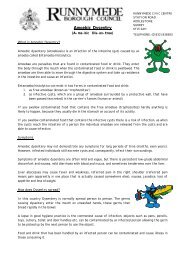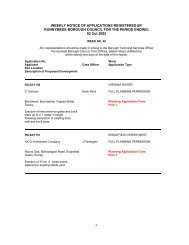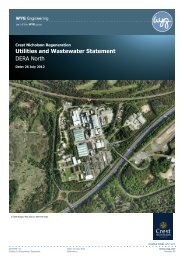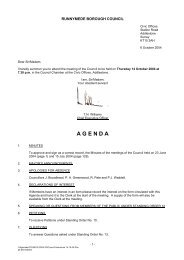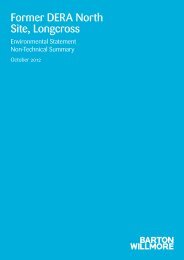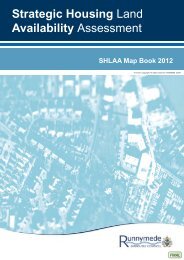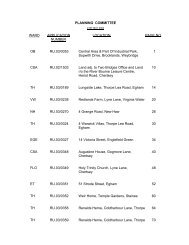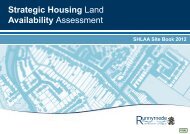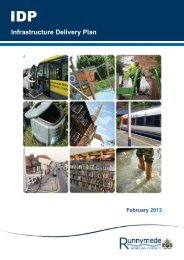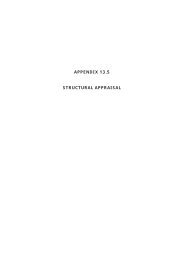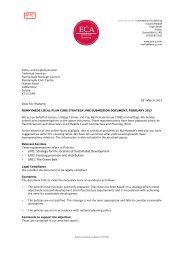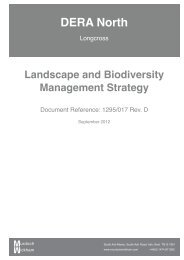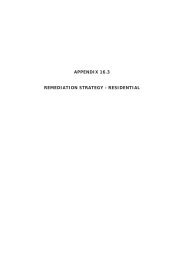DRAFT Sustainability Appraisal Report for the Emerging Local Plan ...
DRAFT Sustainability Appraisal Report for the Emerging Local Plan ...
DRAFT Sustainability Appraisal Report for the Emerging Local Plan ...
You also want an ePaper? Increase the reach of your titles
YUMPU automatically turns print PDFs into web optimized ePapers that Google loves.
11.8 The Directive requires buildings to be made more energy efficient. The Member States must<br />
ensure <strong>the</strong> certification of buildings energy per<strong>for</strong>mance and require <strong>the</strong> regular inspection of<br />
boilers and air conditioning systems in buildings.<br />
European Landfill Directive (1999)<br />
11.9 The Directive is intended to prevent or reduce <strong>the</strong> adverse effects of <strong>the</strong> landfill of waste on<br />
<strong>the</strong> environment, in particular on surface water, groundwater, soil air and human health.<br />
The Sixth Environment Action Programme 2002‐2012<br />
11.10 The Sixth Environment Action Programme sets an objective to reduce greenhouse gases to a<br />
level that will not cause unnatural variations of <strong>the</strong> earth's climate. In <strong>the</strong> short term, <strong>the</strong><br />
European Union's aim is to achieve <strong>the</strong> objectives of <strong>the</strong> Kyoto Protocol, i.e. to reduce<br />
greenhouse gas emissions by 8 % by 2008‐2012 compared with 1990 levels. In <strong>the</strong> longer<br />
term, by 2020 it will be necessary to reduce <strong>the</strong>se emissions by 20 to 40 % by means of an<br />
effective international agreement. To meet <strong>the</strong> challenges of climate change <strong>the</strong> EU will strive<br />
to achieve <strong>the</strong> following objectives: <strong>the</strong> integration of climate change objectives into various<br />
policies, in particular energy policy and transport policy; reduction of greenhouse gases by<br />
means of specific measures to improve energy efficiency, increased use of renewable energy<br />
sources, agreements with industry and to make energy savings; establishment of an EU‐wide<br />
emissions trading scheme; improved research on climate change; improvement of <strong>the</strong><br />
in<strong>for</strong>mation provided to <strong>the</strong> public on climate change; review of energy subsidies and <strong>the</strong>ir<br />
compatibility with climate change objectives; preparing society <strong>for</strong> <strong>the</strong> impact of climate<br />
change.<br />
EU Energy Efficiency <strong>Plan</strong> (2011)<br />
11.11 The EC adopted <strong>the</strong> Communication "Energy Efficiency <strong>Plan</strong> 2011" <strong>for</strong> saving more energy<br />
through concrete measures aimed at creating substantial benefits <strong>for</strong> households, businesses<br />
and public authorities.<br />
National<br />
Climate Change Act (2008)<br />
11.12 The Act sets <strong>the</strong> target <strong>for</strong> greenhouse gas emissions to be cut by at least 34% by 2020, and<br />
by at least 80% by 2050, below 1990 levels. The Act introduced five‐year carbon budgets as a<br />
tool to achieve this target and set up <strong>the</strong> independent Committee on Climate Change.<br />
Energy Act (2011)<br />
11.13 The Act makes provisions <strong>for</strong> energy efficiency measures to homes and businesses – Green<br />
Deal (scheme aimed at improvements to <strong>the</strong> energy efficiency of households and nondomestic<br />
properties) and private rented sector energy efficiency improvements ‐ and<br />
provides measures to enable and secure low‐carbon energy supplies and fair competition in<br />
<strong>the</strong> energy markets.<br />
Part L of Building Regulations (2010)<br />
11.14 Building Regulations cover emissions from energy use through heating, hot water and<br />
building services.<br />
National <strong>Plan</strong>ning Policy Framework (Ch. Meeting <strong>the</strong> challenge of climate change, flooding and<br />
coastal change ‐ Ss. 93, 94, 95, 96, 97 )<br />
11.15 <strong>Local</strong> planning authorities should adopt proactive strategies to mitigate and adapt to climate<br />
change, supporting <strong>the</strong> delivery of renewable and low carbon energy and associated<br />
infrastructure.<br />
National <strong>Plan</strong>ning Policy Framework (Core planning principles – S.17)<br />
11.16 <strong>Plan</strong>ning should support <strong>the</strong> transition to a low carbon economy and encourage <strong>the</strong> reuse of<br />
existing resources and <strong>the</strong> use of renewable resources ; seek to secure high quality design<br />
and a good standard of amenity <strong>for</strong> all existing and future occupants of land and buildings<br />
and contribute to conserving and enhancing <strong>the</strong> natural environment and reducing pollution.<br />
Page | 145 Runnymede BC FINAL <strong>Sustainability</strong> <strong>Appraisal</strong> <strong>Report</strong> – Feb 2013



